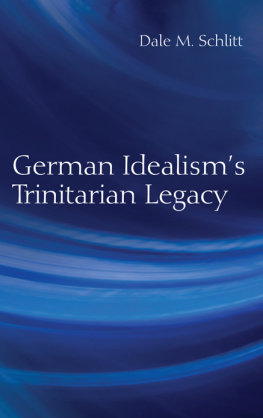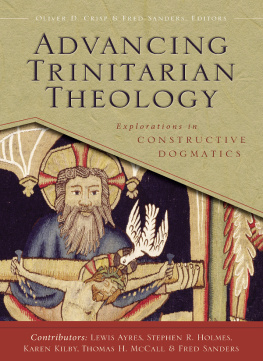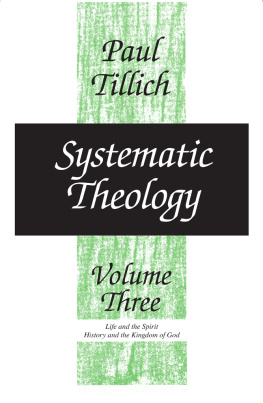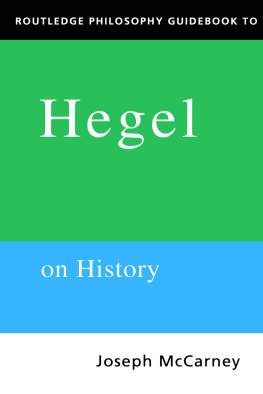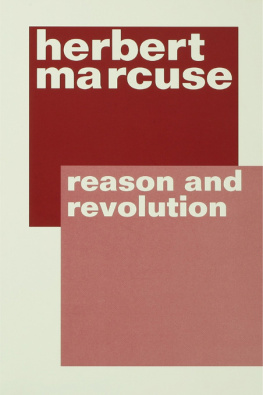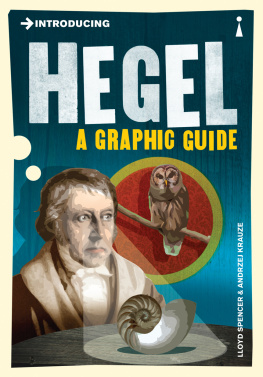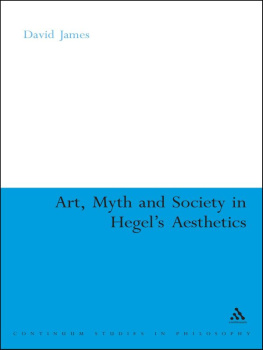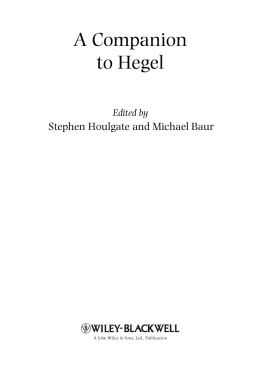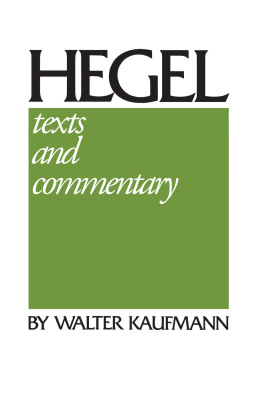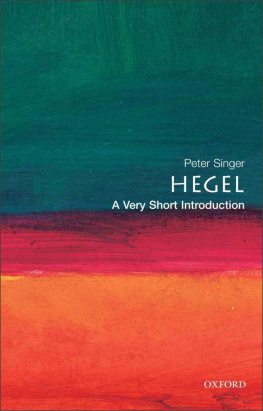German Idealisms Trinitarian Legacy
German Idealisms Trinitarian Legacy
DALE M. SCHLITT
Published by State University of New York Press, Albany
2016 State University of New York
All rights reserved
Printed in the United States of America
No part of this book may be used or reproduced in any manner whatsoever without written permission. No part of this book may be stored in a retrieval system or transmitted in any form or by any means including electronic, electrostatic, magnetic tape, mechanical, photocopying, recording, or otherwise without the prior permission in writing of the publisher.
For information, contact State University of New York Press, Albany, NY
www.sunypress.edu
Production, Eileen Nizer
Marketing, Fran Keneston
Library of Congress Cataloging-in-Publication Data
Names: Schlitt, Dale M., author.
Title: German idealisms Trinitarian legacy / Dale M. Schlitt.
Description: Albany : State University of New York Press, 2016. | Includes bibliographical references and index.
Identifiers: LCCN 2016005980 (print) | LCCN 2016037205 (ebook) | ISBN 9781438462219 (hardcover : alk. paper) | ISBN 9781438462233 (e-book)
Subjects: LCSH: Trinity. | Idealism, GermanHistory. | Philosophical theology.
Classification: LCC BT111.3.S35 2016 (print) | LCC BT111.3 (ebook) | DDC 231/.0440943dc23
LC record available at https://lccn.loc.gov/2016005980
10 9 8 7 6 5 4 3 2 1
Contents
Acknowledgments
Chapter 1 is a slightly modified version of my article, The Whole Truth: Hegels Reconceptualization of Trinity, The Owl of Minerva , Biannual Journal of the Hegel Society of America 15 (1984): 16982, included here with the kind permission of Ardis B, Collins, Editor-in-chief of The Owl of Minerva . A previous version of parts of chapters 2 through 8 appeared in my chapters, German Idealisms Trinitarian Legacy: The Nineteenth Century, German Idealisms Trinitarian Legacy: The Twentieth Century, in The Impact of Idealism: The Legacy of Post-Kantian German Thought , ed. Nicholas Boyle and Liz Disley, vol. 4, Religion , ed. Nicholas Adams (Cambridge: Cambridge University Press, 2013), respectively 4868 and 6990.
I would like to express my deep gratitude to Mr. Andrew Kenyon, Acquisitions Editor, Philosophy, State University of New York Press, for his encouragement and for wise professional guidance through the process of review and publication. Sincere thanks to Ms. Maria M. Garcia, Director of the Oblate School of Theologys Donald E. OShaunessy Library, for overall support and research help and to Ms. Carmen Rodriguez, Library General Services Manager, for so diligently hunting down and obtaining often hard-to-find items through interlibrary loan. A special word of thanks to Prof. Peter C. Hodgson for translation of one of Hegels remarks, particularly difficult to translate, in the margin of one of Hegels texts; to Prof. Renata Furst for discussion and insight concerning aspects of the notions of narrativity and plot; and to Prof. Dr. Martin Wendte for insightfully drawing attention again to Hegels and Schellings development of their thought on Trinity in relation with their thought on various religions of the world.
Introduction
Identifying Idealist Influences
The German Idealists Georg W. F. Hegel and Friedrich W. J. von Schelling are two outstanding thinkers in the overall Greek-Western tradition of reflection on Trinity. Following upon Johan Gottlieb Fichtes proposal to see subjectivity as triadic in structure, they each in his own way developed at great length philosophical readings of Trinity as movement of inclusive divine subjectivity. For Hegel that movement took on a more monosubjectival formulation and for Schelling a more intersubjectival structure. It has been rather widely accepted that they individually and together have significantly influenced many trinitarian thinkers who came after them.
Two previous, shorter studies have confirmed in an initial way that Idealist trinitarian thought, particularly that of Hegel and Schelling, has indeed had a considerable impact on much subsequent trinitarian thinking.
The present study brings together the results of further research and reflection concerning the German Idealist trinitarian legacy. In order , combined with points concerning their trinitarian thought highlighted in the first part of the conclusion to the present study, will alert us to Idealist themes and approaches potentially influencing subsequent trinitarian thinkers. In this overview Schelling will require greater attention and, consequently, a slightly longer presentation than that on Hegel since Schellings trinitarian thought seems less well known, especially in the English-speaking world, than that of Hegel.
To confirm the existence of, and further identify, the overall Idealist trinitarian legacy it is not necessary and perhaps not desirable to aim at more or less comprehensive coverage of potentially relevant trinitarian thinkers following after the Idealists. Rather, I have found that an approach focusing on a number of selected thinkers who in their trinitarian thought exemplify Idealist influence has proven more useful. This approach can help us avoid, so to speak, missing the forest for the trees. For there is a certain, dare we say, elegance in economy. Such economy involves making an argument in relatively succinct fashion, a variant on Occams razor. In the present case, we of course need to work with a sufficient number of thinkers permitting us to argue to, and exemplify Idealist influence on, subsequent trinitarian thinking. And, naturally, selecting such thinkers who may be expected to reflect something of that legacy is quite a delicate task. It inevitably leaves room open for further discussion as to whom we should include and why we should include them. But that is, in a way, the beauty of scholarly research and writing. More generally stated, one makes an argument. Others make counter arguments. And in the process they come to a deeper insight. Perhaps, then, more important than any specific decision taken here about who is to be included in the study is the discussion these decisions may encourage, thus bringing to light further possible indications of Idealist influence on later trinitarian thought.
A fuller consideration of reasons for including certain thinkers in the present study will surely require noting what is said about their thought in the various chapters and in professor in Gttingen University. It continued with a review of material from undergraduate and graduate courses and seminars as well as doctoral seminars on Trinity I had offered over the years at Saint Paul University in Ottawa, Canada, and Oblate School of Theology in San Antonio, Texas. In a second step, these reviews led to the formulation of initial and then, over time, further developed selection criteria: (1) relatively direct access to the selected persons trinitarian thinking which is readily available in a clearly analyzable fashion; (2) in some way documentable identification of the influence of Idealist thought on these persons trinitarian thought; (3) at least for those in the nineteenth century, whether such persons may have played an identifiable role in the transmission of the Idealist trinitarian legacy; (4) for those in the twentieth century, whether they may have played an identifiable role in the transmission and further development of that legacy in a rigorously presented reading of Trinity; and (5) as a further consideration, whether persons could be chosen from earlier and later on in a given period of time being considered.

